新概念英语Lesson5-6讲义及要点
- 格式:doc
- 大小:29.50 KB
- 文档页数:1

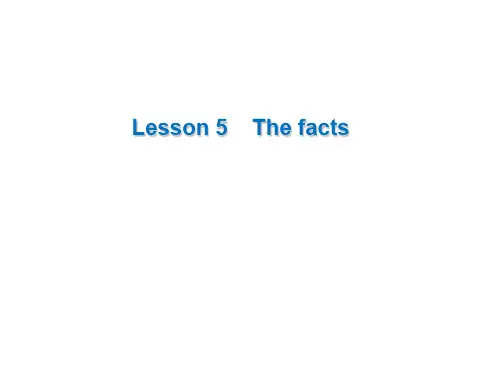
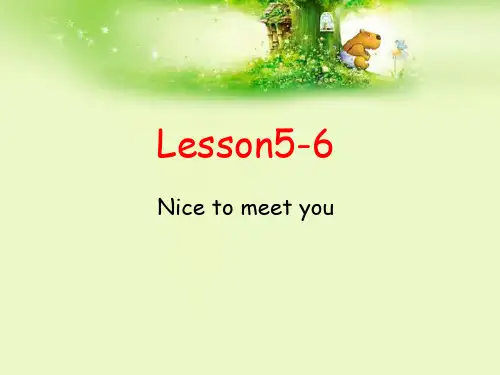
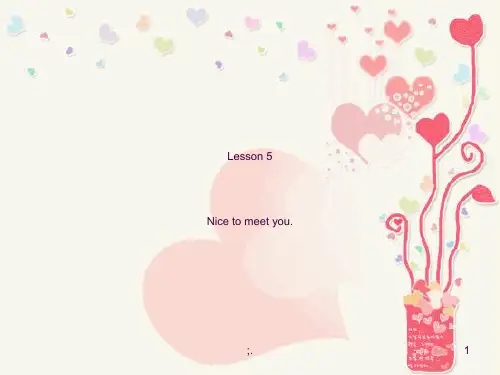
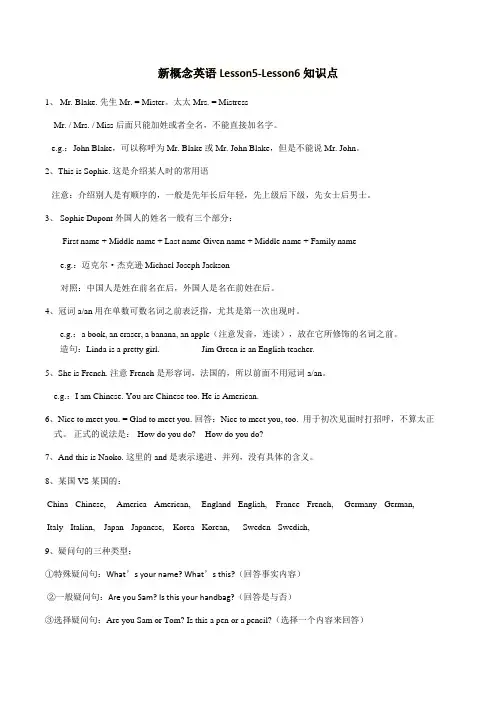
新概念英语Lesson5-Lesson6知识点1、Mr. Blake. 先生Mr. = Mister。
太太Mrs. = MistressMr. / Mrs. / Miss后面只能加姓或者全名,不能直接加名字。
e.g.:John Blake,可以称呼为Mr. Blake或Mr. John Blake,但是不能说Mr. John。
2、This is Sophie. 这是介绍某人时的常用语注意:介绍别人是有顺序的,一般是先年长后年轻,先上级后下级,先女士后男士。
3、Sophie Dupont 外国人的姓名一般有三个部分:First name + Middle name + Last name Given name + Middle name + Family namee.g.:迈克尔·杰克逊 Michael Joseph Jackson对照:中国人是姓在前名在后,外国人是名在前姓在后。
4、冠词a/an用在单数可数名词之前表泛指,尤其是第一次出现时。
e.g.:a book, an eraser, a banana, an apple(注意发音,连读),放在它所修饰的名词之前。
造句:Linda is a pretty girl. Jim Green is an English teacher.5、She is French. 注意French是形容词,法国的,所以前面不用冠词a/an。
e.g.:I am Chinese. You are Chinese too. He is American.6、Nice to meet you. = Glad to meet you. 回答:Nice to meet you, too. 用于初次见面时打招呼,不算太正式。
正式的说法是:-How do you do? -How do you do?7、And this is Naoko. 这里的and是表示递进、并列,没有具体的含义。
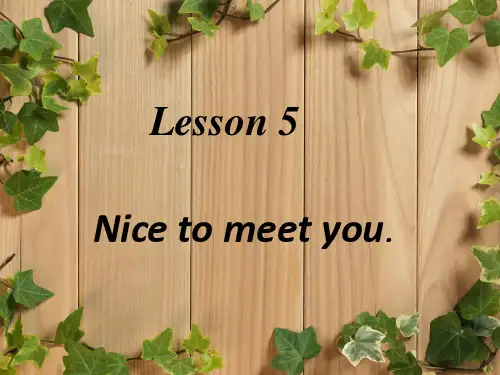

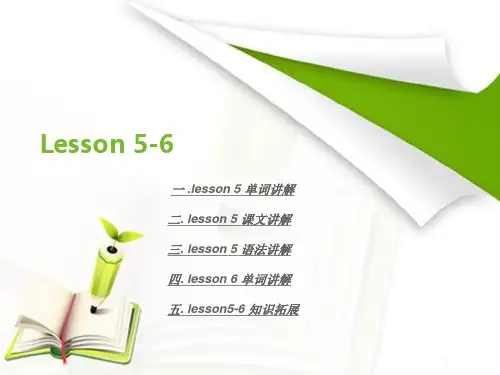
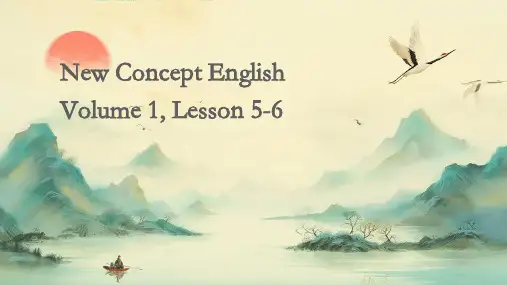

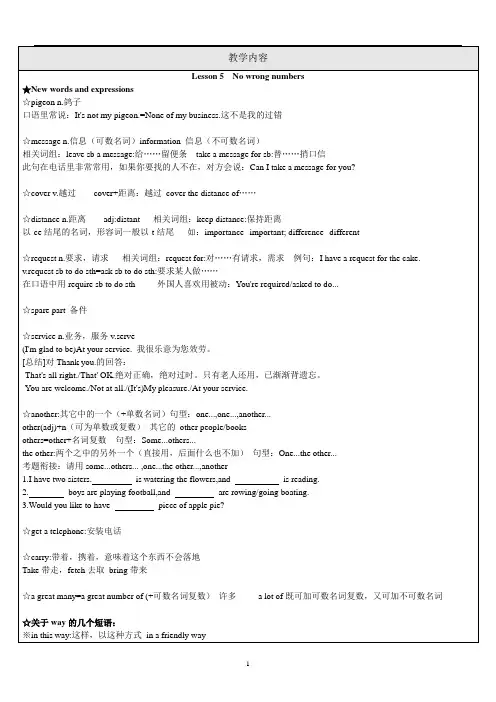
校新概念一讲义Lesson5-6 Nice to meet you. New words1. Mr. 先生Mr.:加在男性的姓氏前面,如:Mister ZhangMrs.:加在已婚女性姓氏的前面,如:Mrs. ZhangMiss:加在未婚女性姓氏的前面,如:Miss Zhang2. new新的反:old 老的3. too 也一般用于肯定句和一般疑问句末,并用逗号与前句隔开.在否定句中表示也,用eigherEg: He is a teacher,tooHe is not a teacher,either.4. French 法国人--- France 法国German德国人---Germany德国Japanese日本人---Japan 日本Korean韩国人--- Korea 韩国Chinese中国人--- China 中国Swedish瑞典人---Sweden 瑞典English 英国人-----England 英国Italian 意大利人---- Italy 意大利Text1. 介绍他人This is …(名字)She /He is ...(具体情况)2.自我介绍I am…3.What make is it? 它是什么牌子的?4.Grammar1、选择疑问句含有be动词的一般疑问句可以合并,合并之后叫做选择疑问句Is she a French student?Is she an English student?Is she a French student(声调↗) or an English student(降调↘)Are you a driver?Are you a teacher?Are you a driver(↗)or teacher(↘)? or 表示选择,译为“ 还是”2、人称代词:I you he she我你他她it we you they 它我们你们他们习题一、写出下列人称代词1. Look at the taxi. is dirty.2. Mr. Ford is a teacher.is a very fat man.3. Alice is a typist. is very young.4. Tom and Sam are students.are students..5. This is my shirt. is clean.6. My mother and I are at home._______________ are at home.7.You and Lucy are tall.________are tall.二、给下列一般疑问句作肯定或否定回答1.---Are you cold?---No, .---Are you hot?---Yes, .2.---Is that pencil long?---No, .---Is it short?---Yes, .3.---Are these books interesting?---Yes, ______ _______.三、用选择疑问句翻译下列句子1.这是桌子还是椅子?___________________________2.它是狗还是猫?___________________________3.那是苹果还是香焦?___________________________四、用括号里的词作出回答1. Is she a nurse or a doctor?(doctor)__________________________________ 2. Are you a French teacher or an English teacher?(English teacher)__________________________________。
把某人介绍给别人时,使用This is …This is my son, Tom.英文中名字表达法:名前姓后Jim Green Justin BieberMs.女士(已婚/未婚皆可,后加自己姓氏)Mrs.夫人(一般指已婚女French 法国人France 法国German 德国人Germany 德国Japanese 日本人Japan 日本Korean 韩国人Korea 韩国Chinese 中国人China 中国Miss.小姐(一般指未婚女子,后加自己姓氏)(1) Nice to meet you!很高兴见到你!①用于熟人或朋友见面;②用于初次与同学、朋友见面等非正式场合。
回答:Nice to meet you, too.(2) How do you do?常用于正式场合初次见面。
回答:How do you do?(3) Nice to see you.一般用于告别时。
回答:Nice to see you, too.辨析too & either①too用于一般疑问句和肯定句句末;Do you like apples, too? / I have a big house, too.② either 用于否定句句末;He doesn't have lessons, either.练⼀练1. I don't study English. My friend doesn't study English, _________.2. This is not my book. That is not my book,_________.3. We go to school by bicycle. They go to school by bicycle,_________.4. She is not from Japan. His husband is not from Japan,_________.5. I am a student. Are you a student, _________?6. They don't work on Saturday. We don't work on Saturday,_________.7. She has a new coat. I have a new coat,_________.=What is the make of it?What is the make of your car? = What make is your car?你的汽车是什么牌子的?It is a Benz.(注意:车牌是可数名词)It's a Swedish car.It's a French car.It's a German car.It's a Japanese car.It's a Korean car.It's an English car.It's an American car.It's an Italian car.Stella is a student. She isn't German. She is Spanish.She SheItHe HeItIs she a French student or a Swedish student?She isn't a Swedish student. She is a French student.Is it a Swedish car or a French car? It isn't a French car. It's a Swedish.1. Is she a Japanese student or a German student? She isn't a German student. She is a Japanese student.2. Is it a French car or a Germa car?It isn't a German car. It is a French car.3. Is he a German student or an Italian student?He isn't an Italian sudent. He is a German student. 4. Is she a Chinese student or an Italian student? She isn't an Italian student. She is a Chinese student.5. Is it an English car or an American car?It isn't an American car. It is an English car.6. Is he a Korean student or a Japanese student? He isn't a Japanese student. He is a Korean student.7. Is it an Italian car or an English car?It isn't an English car. It is an Italian car.9. Is it a German car or a French car?It isn't a French car. It is a German car.10. Is it a Japanese car or a Chinese car?It isn't a Chinese car. It is a Japanese car.11. Is it an American car or an English car?It isn't an English car. It is an American car.一般疑问句 & 选择疑问句的区别一般疑问句选择疑问句结构语调答句举例句末没有or句中含有or 句末通常用升调通常用Yes/Noor前用升调or后用降调根据事实情况选择其中一个回答Are you Japanese?Yes, IamNo, I'm not.Are you French orGerman?I am German.。
Lesson 5-6 课堂知识点:
本节课重点单词和扩充:
1. Good night. 晚安
Sweet dreams. 好梦。
2. be good for 对…好
3. be good at sth/ doing sth. 擅长某事/做某事
4. new adj. 新的反义词:old adj. 旧的
5. nice adj. 和蔼的,友好的
be nice to 对…友好的
nice adj. 使人高兴的,令人愉快的
It is nice to do sth 做某件事令人愉快。
本节课重点知识点:
1. 表示某样东西属于哪一国的‘在物品前加国家形容词’
一辆中国的汽车 a Chinese car
一个英国的杯子an English cup
2. 表示问候的同意表达:
Nice to meet you.
= Nice to see you.
= How do you do?
3. 询问物品的品牌:What make is it?
4. 第三人称代词主格
她she
他he
它it
注意:
1. 表示某人时某国人时前面无需加a/an,例如:她是法国人。
She is French.
2. 但是表示某样东西的国籍时需要添加a/an,例如:这是一辆中国的汽车。
This is a Chinese car.。
Lesson5-6学习要点
一、Mr. / 先生;Mrs. / 太太;Miss / 小姐;Ms / 女士
二、姓氏:
东方人:姓前名后;西方人:名前姓后;名字:first name;姓:last name
Mr. Black / 布莱克先生
1、Sophie Dupont;
2、Alice Green;
3、Mary Smith
I am Chinese. = I am from China.
You are Japanese. = You are from Japan.
He is Korean. = He is from Korea.
His father is American. = His father is from America.
三、职业类单词:
doctor / nurse;teacher / student;worker / farmer;waiter / waitress(女服务生);cook;policeman;milkman;driver;actor(男演员)/ actress(女演员);fireman postman;housewife(全职太太);solder(战士);host(男主持人)/ hostess(女主持人、女主人);air hostess(空姐);hairdresser (发型师);baker(面包师);mechanic[mi'kænik](机械师);Lawyer 律师;accountant 会计四、问职业:
What’s your job?
I am a ……
What’s his job?
He is a ……
What’s Sophie Dupont’s job?
She is a ……
What are you? = What’s job?
五、注意点:
元音字母开头的国家名English、American、Italian 前面用an
六、抄写词语:9个国家、每个四遍、一排两个。
背Lesson 5。
七、句型练习:
1、你是他女儿吗?是的。
2、他们不是我的老师。
3、那是你爸爸的车吗?是的。
什么牌子?是福特。
4、她是意大利人。
(用两种方法做)。